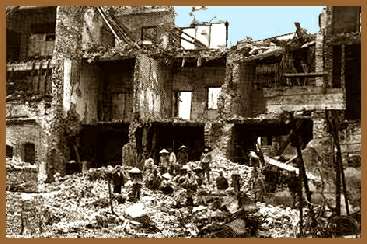|
11. 7 The Korean War
When the World War II came to an end, the Red Army
(USSR) occupied Korea, north of the 38th parallel. And in the south,
the U.S. and Allied forces were in control. In 1948, when the UN
introduced elections in Korea, the North Korean territory refused
to join it. After the elections in the south, the Republic of Korea
was born under the President Syngman Rhee. The American troops withdrew
from Korea in 1949. In 1950, the communist forces in North Korea
tried to invade the south. American forces were sent immediately.
The UN denounced the North Korean action. While the War between
communist troops and the Americans along with South Korean army
was on, the Chinese army joined the War. China which was a communist
nation drove the UN troops back to the 38th parallel. The War dragged
on without any concrete results.
The War in Korea and later in Vietnam had an adverse
effect back home. As the War went on, public opinion went against
the War. America which had entered the War to get rid of ícommiesí
was not very confident any more, due to the strong anti-war sentiments
at home.

Exhibit 11.2
Images of destruction during the Vietnam War
A peace accord was signed in 1973, which brought
one of the longest and the most tragic war fought in American history.
During the period after the Korean War, American people had to face
a series of problems at home. Although the general prosperity in
the country improved the standard of living for the people, economic
depressions occurred regularly: there was unemployment that continued
to persist in both the industrial sector and other spheres. Moreover,
the farmers were not doing well economically either. There was a
severe crisis in the various spheres of American society eg. Education,
the Black American movement i.e. the Civil Rights Movement and Urban
Development. These serious domestic problems were some of the challenges
before the Republican government headed by Dwight D. Eisenhower
(1953-1961) and his successor, President John F. Kennedy (Democrat)
took over in 1961. Apart from the domestic issues, there was the
enormous threat of communism that loomed over America.
[Next Page]
|